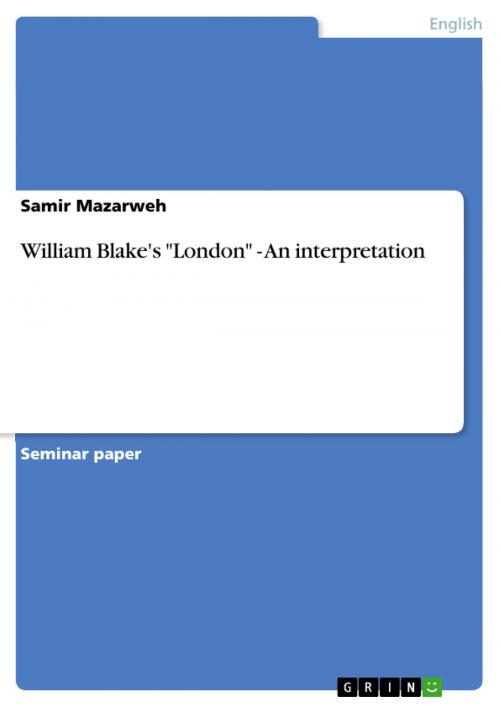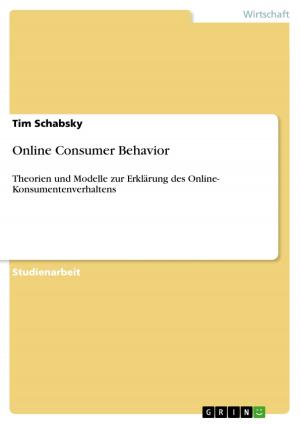William Blake's 'London' - An interpretation
Fiction & Literature, Literary Theory & Criticism, British| Author: | Samir Mazarweh | ISBN: | 9783640779956 |
| Publisher: | GRIN Verlag | Publication: | December 17, 2010 |
| Imprint: | GRIN Verlag | Language: | English |
| Author: | Samir Mazarweh |
| ISBN: | 9783640779956 |
| Publisher: | GRIN Verlag |
| Publication: | December 17, 2010 |
| Imprint: | GRIN Verlag |
| Language: | English |
Seminar paper from the year 2010 in the subject English Language and Literature Studies - Literature, grade: 1,7, University of Heidelberg (Anglistik), course: Proseminar 1 London, language: English, abstract: This paper tries to provide an insight into the analysis of 18th century author William Blake´s poem `London´. Comments from Blake experts like the following from Edward Thompson make this task appear easy. He said: '`London´ is among the most lucid and instantly available of the Songs of Experience.' On the one hand I agree to this statement. The poem itself is easy to understand, not much background information about the author´s life, his visions, and his complete works is required to grasp the message. However, an analysis has to provide more than just make the message of a poem understandable. It should inter alia deal with the circumstances the author lived in, the work of which the poem is part of, and last but not least, the stylistic devices and linguistic images used in this piece of art. In the case of `London´, this has been done by professionals many times, a fact leading us to another important point that makes the task appear easier than it actually is: The mass of biographies, comments, analyses, and criticisms that have been written about Blake and his works. The advantage is obvious: Every line of `London´ has been discussed and commented on, and all that must be done is find adequate information. At the same time this amount of literature presents many different approaches to analyse the poem; too many to introduce them in a seminar paper. Hence, this assignment tries to show a few aspects only: After introducing the author and the `Songs of Innocence and of Experience´ briefly, it follows a short summary of the poem and an overview of the stylistic devices. The sixth chapter is the analysis itself, focusing on the social criticism of the poem and dealing with the 'very complex relations between reading, and hearing, and seeing'.
Seminar paper from the year 2010 in the subject English Language and Literature Studies - Literature, grade: 1,7, University of Heidelberg (Anglistik), course: Proseminar 1 London, language: English, abstract: This paper tries to provide an insight into the analysis of 18th century author William Blake´s poem `London´. Comments from Blake experts like the following from Edward Thompson make this task appear easy. He said: '`London´ is among the most lucid and instantly available of the Songs of Experience.' On the one hand I agree to this statement. The poem itself is easy to understand, not much background information about the author´s life, his visions, and his complete works is required to grasp the message. However, an analysis has to provide more than just make the message of a poem understandable. It should inter alia deal with the circumstances the author lived in, the work of which the poem is part of, and last but not least, the stylistic devices and linguistic images used in this piece of art. In the case of `London´, this has been done by professionals many times, a fact leading us to another important point that makes the task appear easier than it actually is: The mass of biographies, comments, analyses, and criticisms that have been written about Blake and his works. The advantage is obvious: Every line of `London´ has been discussed and commented on, and all that must be done is find adequate information. At the same time this amount of literature presents many different approaches to analyse the poem; too many to introduce them in a seminar paper. Hence, this assignment tries to show a few aspects only: After introducing the author and the `Songs of Innocence and of Experience´ briefly, it follows a short summary of the poem and an overview of the stylistic devices. The sixth chapter is the analysis itself, focusing on the social criticism of the poem and dealing with the 'very complex relations between reading, and hearing, and seeing'.















